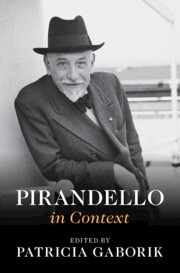Book contents
- Pirandello in Context
- Pirandello in Context
- Copyright page
- Dedication
- Contents
- Figures
- Contributors
- Preface
- Acknowledgments
- Chronology
- List of Cited Titles in Translation and the Original Italian
- Part I Places
- Part II Institutions
- Part III Interlocutors
- Part IV Traditions and Trends, Techniques and Forms
- Chapter 18 Humor
- Chapter 19 Dialect Theatre
- Chapter 20 Metatheatre
- Chapter 21 The Fourth Wall
- Chapter 22 The Anti-Character
- Chapter 23 Myth
- Chapter 24 The Fantastic
- Part V Culture and Society
- Part VI Reception and Legacy
- Further Reading
- Index
Chapter 20 - Metatheatre
from Part IV - Traditions and Trends, Techniques and Forms
Published online by Cambridge University Press: 14 March 2024
- Pirandello in Context
- Pirandello in Context
- Copyright page
- Dedication
- Contents
- Figures
- Contributors
- Preface
- Acknowledgments
- Chronology
- List of Cited Titles in Translation and the Original Italian
- Part I Places
- Part II Institutions
- Part III Interlocutors
- Part IV Traditions and Trends, Techniques and Forms
- Chapter 18 Humor
- Chapter 19 Dialect Theatre
- Chapter 20 Metatheatre
- Chapter 21 The Fourth Wall
- Chapter 22 The Anti-Character
- Chapter 23 Myth
- Chapter 24 The Fantastic
- Part V Culture and Society
- Part VI Reception and Legacy
- Further Reading
- Index
Summary
“Metatheatre,” the term coined by Lionel Abel, flourished in the baroque (roughly 1550–1650) and modernist (or neobaroque, twentieth century) in Europe and the United States. Rather than representing the illusion of reality, it represents the reality of illusion. Pirandello’s Henry IV may be read as a modernist rendering of Hamlet. More radically than Hamlet, “Henry” perceives the impossibility of grasping truth beneath appearances and chooses to live in theatrical play forever. This chapter compares Six Characters in Search of an Author to an untitled play by the baroque artist Gian Lorenzo Bernini. Both feature characters angry at their author and discussion of a play to be made. In each, the “fourth wall” is removed to reveal theatre-in-process. Instead of portraying theatre as an imitation of life, metatheatre reveals life’s inherent theatricality.
Information
- Type
- Chapter
- Information
- Pirandello in Context , pp. 163 - 169Publisher: Cambridge University PressPrint publication year: 2024
